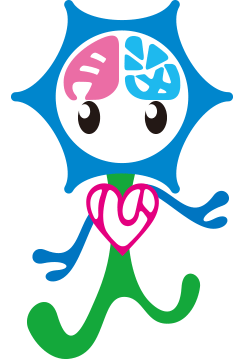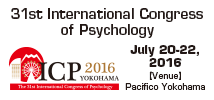Neuroscience 2016
be sound, brain and mind
- Date
- July 20-22, 2016
- Venue
- Pacifico Yokohama
- President
- Atsushi Iriki (RIKEN Brain Science Institute)

Satellite Symposia
- International Symposium on “Microendophenotype of psychiatric disorders”
- The Origin of Consciousness
- Basal Ganglia in Health and Disease
- STRESS AND BEHAVIOR: YOKOHAMA-2016
- Call for Proposals for Satellite Symposia
Satellite Symposia
| Date | July 19 (Tue), 10:00~17:30 (Registration starts at 9:30) |
|---|---|
| Venue | Event Hall A, YOKOHAMA “WORLD PORTERS” 6F |
| Chairs | Satoshi Kida (Tokyo University of Agriculture) Grant-in-Aid of MEXT on Innovative Area (Microendophenotype of psychiatric disorders) |
| Speakers | Cyril Herry (INSERM, Neurocentre Magendie, France) Andrew Holmes (NIH/NIAAA, USA) Mazen Kheirbek (University of California San Francisco, USA) Attila Losonczy (Columbia University, USA) Guo-Li Ming (Johns Hopkins University, USA) Kazu Nakazawa (University of Alabama, USA) Hongjun Song (Johns Hopkins University, USA) Jun Yao (Tsinghua University, China) Akiko Hayashi-Takagi (Gunma University) Tadafumi Kato (RIKEN Brain Science Institute) Satoshi Kida (Tokyo University of Agriculture) Hiroyuki Nawa (Niigata University) |
| Purpose of the symposium | Psychiatric disorders including Schizophrenia, Depression, Bipolar disorder, anxiety disorders and PTSD are caused not only by genetic factors but also by complicated factors such as environmental ones. However, the biological indices of psychiatric disorders are unknown, and their pathologic condition cannot be easily visualized at the microscopic level, unlike senile plaques of Alzheimer’s disease. On the other hand, the mechanisms by which brain functions are controlled at the molecular, cellular, and circuit levels are not understood well. Therefore, unraveling the mechanisms of psychiatric disorders requires a variety of approaches including both basic and clinical studies. On the basis of this background, we have tried to develop a new and innovative area studying psychiatric disorders, in which basic researchers using state-of-the-art techniques will collaborate with clinical researchers to use basic and clinical studies to understand psychiatric disorders. To do this, we proposed “micro-endophenotypes” that are the visualized phenotypes of psychiatric disorders at the molecular, cellular and circuit levels, as an interface between basic and clinical studies, and have tried to identify micro-endophenotypes and understand their molecular basis. In this symposium, members in our innovative area and invited speakers will introduce current progress of basic researches related to psychiatric disorders at the cellular and circuit levels. This symposium is oorganized and supported by the Grant‐in‐Aid for Scientific Research on Innovative Areas, “Microendophenotype of psychiatric disorders”. Please see the program of this symposium at http://microend.umin.ne.jp. |
| Contact | Satoshi Kida (Tokyo University of Agriculture) E-mail micro@nodai.ac.jp Tel: +81-3-5477-2318 http://microend.umin.ne.jp No attendance fee but registration is required; e-mail information (name, title, institution) to micro@nodai.ac.jp. (Deadline, July 16th) |
| Date | July 25-26, 2016 |
|---|---|
| Venue | Tokyo Institute of Technology Earth-Life Science Institute |
| Chairs | Mel Goodale (The University of Western Ontario, CANADA) Ryota Kanai (ELSI, Tokyo Institute of Technology & Araya Brain Imaging, JAPAN) Piet Hut (ELSI, Tokyo Institute of Technology, JAPAN & The Institute for Advanced Study, USA) |
| Speakers | Tim Bayne (The University of Manchester, UK) Mel Goodale (The University of Western Ontario, CANADA) Nicholas Guttenberg (ELSI, Tokyo Institute of Technology, JAPAN) Toshiyuki Hirabayashi (National Institute of Radiological Sciences, JAPAN) Piet Hut (ELSI Tokyo Institute of Technology, JAPAN, Princeton IAS, USA) Atsushi Iriki (RIKEN BSI, JAPAN) Ryota Kanai (ELSI Tokyo Institute of Technology, Araya Brain Imaging, JAPAN) Robert Kentridge (Durham University, UK) Joe Kirschvink (California Institute of Technology, USA) Rafi Malach (Weizmann Institute of Science, ISRAEL) Jun Miyata (Kyoto University, Japan) Masanori Murayama (RIKEN BSI, JAPAN) Masafumi Oizumi (RIKEN BSI, JAPAN) Ron Rensink (University of British Columbia, CANADA) Lisa Saksida (University of Cambridge, UK) Katsuei Shibuki (Niigata University, JAPAN) Shinsuke Shimojo (California Institute of Technology, USA) Takeshi Yagi (Osaka University, JAPAN) Makiko Yamada (National Institute of Radiological Sciences, JAPAN) Masatoshi Yoshida (National Institute for Physiological Sciences, JAPAN) |
| Purpose of the symposium | Why and how consciousness emerges from the brain is one of the fundamental questions about human existence. While the question on the origin of consciousness has a long history, scientific approach to this problem is relatively new, because the subjective nature of consciousness had long been believed to evade objective science. However, the last 25 years have seen a surge of new empirical results from neuroscience showing the relationships between the brain and conscious experience. In particular, neural substrates for the contents of subjective experience and the levels of consciousness (i.e, the neural correlates of consciousness) have been extensively studied both in animals and humans. Moreover, new theoretical researches into consciousness, such as the integrated information theory, are now providing new insights into the informational basis of consciousness. In this symposium, researchers from diverse fields of neuroscience and beyond will discuss the origin of consciousness and possible future directions. |
| Conference Aid Office | Ryota Kanai (ELSI, Tokyo Institute of Technology & Araya Brain Imaging, JAPAN) Mail:kanair@elsi.jp, kanair@araya.org Tel:+81-3-6272-8703 More information and registration regarding ELSI at Tokyo Institute of Technology Satellite Symposium can be viewed at: http://originofconsciousness.jimdo.com |
| Date | July 19 (Tue), 2016 13:00 - 18:30 |
|---|---|
| Venue | Pacifico Yokohama Conference Center 4F (Room 411+412) |
| Expected member of attendees | 160 persons |
| Organizers |
|
| Speakers |
|
| Purpose of the symposium | The basal ganglia (BG) were originally considered to be involved mainly in motor control. However, the recent progress of BG research reveals that malfunction of BG may induce non-motor symptoms in addition to motor deficit in BG disorders such as Parkinson's disease. In this satellite symposium, Profs. Jose A. Obeso and Wolfram Schultz, the distinguished scientists and invited speakers of the symposium in the Neuroscience2016 (July 21 Thu, 9-11AM) and the first-line scientists in this field will discuss the latest progress of researches focusing on the roles of dopamine in the BG, the pathophysiology and therapeutic strategy of BG disease and the involvement of BG in the cognitive and emotional functions, and the future direction in this field. It is hoped that the symposium will encourage both international cooperation and researchers. This symposium is related to and supported by the Grant‐in‐Aid for Scientific Research on Innovative Areas, “Oscillology” Non-linear Neuro-oscillology: Towards Integrative Understanding of Human Nature and the Brain Research Institute, Niigata University. Please see the program of the satellite symposium at (http://www.nips.ac.jp/sysnp/Symposium/BG2016/index.html). |
| Contact |
|
| Date | July 24 (Sun), July 25 (Mon), 2016 |
|---|---|
| Venue | Tokyo City University, Yokohama Campus |
| Expected member of attendees | 150 persons |
| Organizers | Shun Nakamura, Co-Chair, International Stress and Behavior Society Allan Kalueff, Co-Chair, International Stress and Behavior Society |
| Speakers |
|
| Purpose of the symposium | ISBS is the international society of experts working with a wide range of topics in the field of translational neuroscience, neurobehavioral sciences, biopsychology and biopsychiatry, with a particular focus on stress, stress-related neurobehavioral phenotypes, their neural, molecular and genetic mechanisms, as well as stress-evoked neuropsychiatric disorders. The first regional meeting at ASIA was held at Kobe as a satellite symposium of 38th Japan Neuroscience Conference last year and was successful with more than 120 participants including 90 persons from over 20 countries such as Thailand, China, Korea, India, and Russian. The second meeting will be fully open during July 24-25 at Yokohama. Four research topics will be 1. Connectome analysis of stress-related disorders. 2. Affective care in NICU and the cohort study after the discharge from NICU. 3.Social withdrawal of young people and the support on the basis of the theory of cognitive behavior science 4. PTSD and its recovery after natural and social disasters. Anyone interested in stress-related human or animal behaviors, neurobehavioral disorders and their mechanisms are welcome as a lecturer, symposium speaker, and poster presenter. |
| Contact | Shun Nakamura, PhD (Tokyo Univeristy of Agriculture and Technoloy, CorLab Inc., Tokyo, Japan) nakashn@cc.tuat.ac.jp, Tel: +81-42-388-7251 |
Call for Proposals for Satellite Symposia
Proposals for satellite symposia at Neuroscience 2016 are now being invited.
Proposals approved as official satellite symposia will receive the following publicity from the Meeting.
- Publication in the Meeting Program
- Publication on the Meeting Web site (including possible links to satellite Web sites)
- Publication in Neuroscience 2016 E-Newsletter (E-mail magazine)
Organizations wishing to hold satellite symposia are requested to E-mail the following information to the Neuroscience 2016 Secretariat (neurosci2016@jtbcom.co.jp).
Required information
- Symposia title (theme)
- Venue
- Date and time
- Size (expected number of attendees)
- Organizer (please include name of affiliated institution)
- Symposia panel members (please include names of affiliated institutions)
- Outline of Symposia
- Contact details (name, affiliated institution, E-mail address, and telephone number of contact person)
- Name of co-host or sponsor if applicable
- Notes
-
- The organizers must include a member of the Japan Neuroscience Society.
- Please ensure that symposia do not overlap with the main program for the Meeting (including events such as receptions).
- The Meeting has the status of co-host, and will not be involved with the running of the symposia.
- In principle, organizers of satellite symposia are responsible for paying venue fees and management costs themselves.
- The Executive Committee will take the venue, scale, and other factors given in the application into consideration for the confirmation of official satellite seminars when responding to applications.
(Please be aware that it may not be possible to meet all the requests of a particular application in some cases.)
Venues
The organizers have reserved some rooms (not the entire premises) of the Pacifico Yokohama on the day before the Meeting for setup preparations. It may be possible to use the Pacifico Yokohama for satellite symposia on this day, depending on time and venue. Symposia organizers who wish to do this should consult the Neuroscience 2016 Secretariat (neurosci2016@jtbcom.co.jp).
- Date:
- Tuesday, July 19, 2016
- Venue:
- Pacifico Yokohama
Contact: Neuroscience 2016 Secretariat
JTB Communication Design, Inc. (former ICS Convention Design, Inc.)
Celestine Shiba Mitsui Bldg. 3-23-1, Shiba, Minato-ku, Tokyo 105-8335, Japan
Tel: +81-3-5657-0777 / Fax: +81-3-3452-8550
E-mail: neurosci2016@jtbcom.co.jp
*Contact information has been changed as mentioned above from April, 2016.



